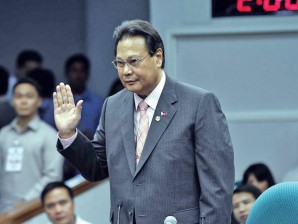During an appearance in his Senate impeachment trial on May 22, then Chief Justice Renato Corona signed a waiver on the confidentiality of his bank accounts.
He challenged the 188 House representatives who signed the articles of impeachment against him and Senator Franklin Drilon, who helped the prosecutors secure evidence against him in the course of his trial, to do the same.
“Join me in a moment of truth as a gesture of transparency and reconciliation with the Filipino people and to one another,” Corona said.
He signed a draft waiver authorizing all banking institutions, the Anti-Money Laundering Council, Bureau of Internal Revenue, Securities and Exchange Commission and the Land Registration Authority to disclose to the public any information showing his assets, business interests and financial connections, including his wife’s.
The waiver also authorized the Supreme Court clerk of court, with permission from the tribunal en banc, to release his statement of assets, liabilities and net worth (SALN) from 2002 to 2011.
Corona then instructed his defense lawyers to distribute blank copies of the waiver he had just signed. He said that he would submit the waiver he signed to the appropriate agencies but only if the “189 waivers have been signed.”
Except for four lawmakers, the others rejected Corona’s challenge and branded the move as a stunt.
On May 25, on the second day of his appearance in the Senate trial, Corona submitted an unconditional waiver authorizing scrutiny of all his bank accounts.
“I will no longer wait for the waivers of the 189 (lawmakers). I’m submitting this without any conditions whatsoever,” Corona said.
The unconditional waiver prompted senators to halt the proceedings and tackle the matter in caucus. When the session resumed, Senate President Juan Ponce Enrile, the court’s presiding officer, told Corona that the court would only take “note of the waiver, but can’t act on it.”
Source: Inquirer Archives
